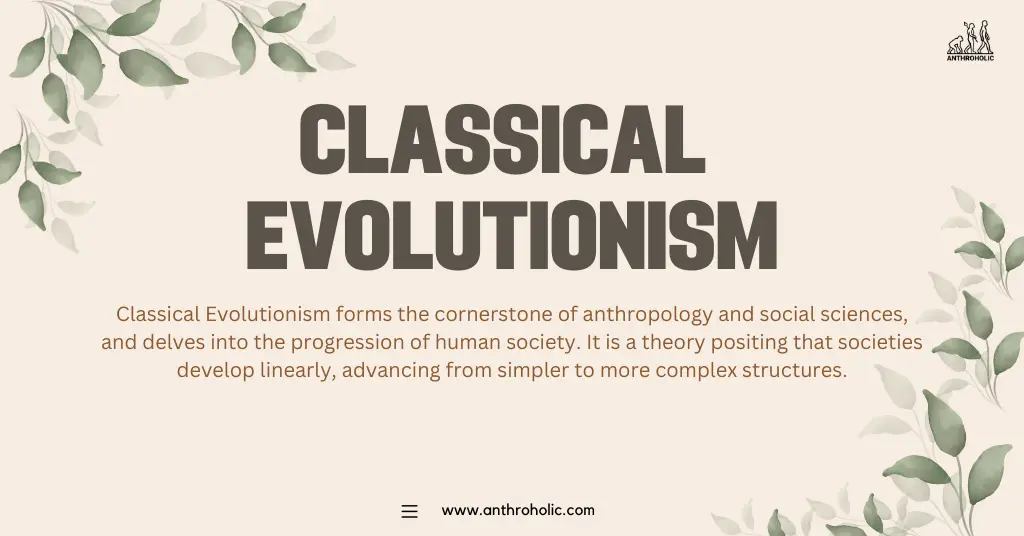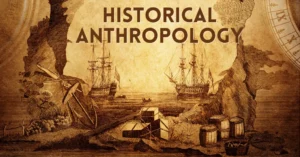AI Answer Evaluation Platform Live Now. Try Free Answer Evaluation Now
Classical Evolutionism
Classical Evolutionism forms the cornerstone of anthropology and social sciences, and delves into the progression of human society. It is a theory positing that societies develop linearly, advancing from simpler to more complex structures [1]. Herein, we shall dissect Classical Evolutionism’s inception, key theories, criticisms, and influence on contemporary anthropological thought.

Origins of Classical Evolutionism
Classical Evolutionism originated in the 19th century, amidst the rise of social sciences. Early evolutionists like Herbert Spencer and Edward Burnett Tylor conceptualized society as a living organism, evolving from primitive to civilized stages [2].
- Herbert Spencer: Spencer, a philosopher and biologist, coined the term “survival of the fittest.” He proposed that societies, akin to biological entities, compete for survival, leading to their evolution [3].
- Edward Burnett Tylor: Known as the father of cultural anthropology, Tylor posited that societies progressed from savagery, through barbarism, to civilization, implying a single path of human cultural evolution [4].
Key Theories
Unilinear Evolution
Pioneered by Lewis Henry Morgan, Unilinear Evolution suggests all societies traverse identical development stages, albeit at different times. The stages, as proposed by Morgan, are savagery, barbarism, and civilization [5].
Table 1: Morgan’s stages of Unilinear Evolution
| Stage | Characteristics |
|---|---|
| Savagery | Primitive technology, Nomadic lifestyle, Hunting and gathering |
| Barbarism | Agricultural practices, Primitive construction, Early states |
| Civilization | Advanced technology, Permanent cities, Complex government |
Multilinear Evolution
Julian Steward, a mid-20th century anthropologist, argued against unilinearity, asserting that different societies may follow different evolutionary paths, termed Multilinear Evolution. He emphasized the role of the environment in shaping society’s cultural adaptations [6].
Criticisms of Classical Evolutionism
Despite its foundational role, Classical Evolutionism has been subject to several criticisms:
- Ethnocentrism: Critics argue that the “savage to civilized” progression is ethnocentric, biasing towards Western culture [7].
- Ignorance of Historical Particularity: Classical evolutionism often overlooked the unique paths individual societies took to their current states [8].
- Neglect of External Influences: The theory largely ignored external influences like trade, conflict, and cultural diffusion on societal evolution [9].
Contemporary Significance and Influence
Despite criticisms, Classical Evolutionism has greatly influenced anthropological thought. It prompted a shift from viewing societies as static entities to understanding them as dynamic, evolving constructs. Concepts like cultural relativism and historical particularism emerged as responses to the shortcomings of Classical Evolutionism [10].
Furthermore, it spurred sociocultural theories like Functionalism and Structuralism, which analyze society’s constituent elements and their interrelationships [11].
Evolutionism in Modern Discourse
Classical Evolutionism’s legacy persists in current sociocultural anthropology. While we no longer view cultures as higher or lower on an evolutionary scale, the concept of cultural adaptation and change remains relevant [12].
- Cultural Adaptation: Evolutionism highlights that societies modify behaviors and institutions to adapt to changing circumstances. This concept is widely accepted in contemporary anthropology [13].
- Cultural Change: While rejecting the ethnocentric progression model, modern anthropologists still acknowledge that cultures are not static. They continuously change and evolve due to internal dynamics and external influences [14].
Evolutionism and Social Policy
Classical Evolutionism has significantly influenced social policy and international development. Historically, its hierarchical view of cultures was used to justify colonial practices and assimilation policies [15]. Today, however, its influence has led to more nuanced approaches in international development.
- From Assimilation to Participation: In the past, ‘less developed’ societies were expected to mimic ‘advanced’ societies to progress. Now, development policies focus on local participation and cultural sensitivity [16].
- Cultural Sustainability: Modern development programs recognize the value of cultural diversity and sustainability, aiming for culturally appropriate development [17].
Classical Evolutionism and its Broader Impact
Classical Evolutionism’s influence extends beyond the academic realm, impacting public perception and policy. While the theory itself has evolved to correct its flaws, it remains a key lens through which we interpret societal change.
Conclusion
Classical Evolutionism, despite its flaws, remains instrumental in social sciences. By sparking a dialogue on societal development, it set the stage for future anthropological theories and perspectives. Further refinements to this model continue, leading to a more nuanced understanding of societal progression.
References
[1] Ingold, T. (2004). Evolution and social life. Routledge.
[2] Kuper, A. (1996). Anthropology and anthropologists: the British school in the twentieth century. Routledge. https://archive.org/details/anthropologyandanthropologists
[3] Spencer, H. (1857). Progress: Its Law and Cause. Chapman & Hall.
[4] Tylor, E.B. (1871). Primitive Culture. J. Murray.
[5] Morgan, L.H. (1877). Ancient Society. Charles H. Kerr & Company.
[6] Steward, J.H. (1955). Theory of Culture Change. University of Illinois Press.
[7] Kuklick, H. (1991). The savage within: The social history of British anthropology, 1885-1945. Cambridge University Press. https://www.jstor.org/stable/3630445
[8] Boas, F. (1896). The Limitations of the Comparative Method of Anthropology. Science.
[9] Wolf, E.R. (1982). Europe and the People Without History. University of California Press.
[10] Harris, M. (1968). The Rise of Anthropological Theory. AltaMira Press.
[11] Leach, E.R. (1954). Political Systems of Highland Burma. Harvard University Press.
[12] Carneiro, R.L. (2003). Evolutionism in Cultural Anthropology: A Critical History. Westview Press.
[13] Diamond, J. (1997). Guns, Germs, and Steel: The Fates of Human Societies. W. W. Norton & Company.
[14] Linton, R. (1936). The Study of Man. Appleton-Century.
[15] Said, E. (1978). Orientalism. Pantheon Books.
[16] Chambers, R. (1997). Whose Reality Counts? Putting the First Last. Intermediate Technology Publications.
[17] United Nations (2004). The Creative Economy Report 2004. UNDP and UNCTAD.




